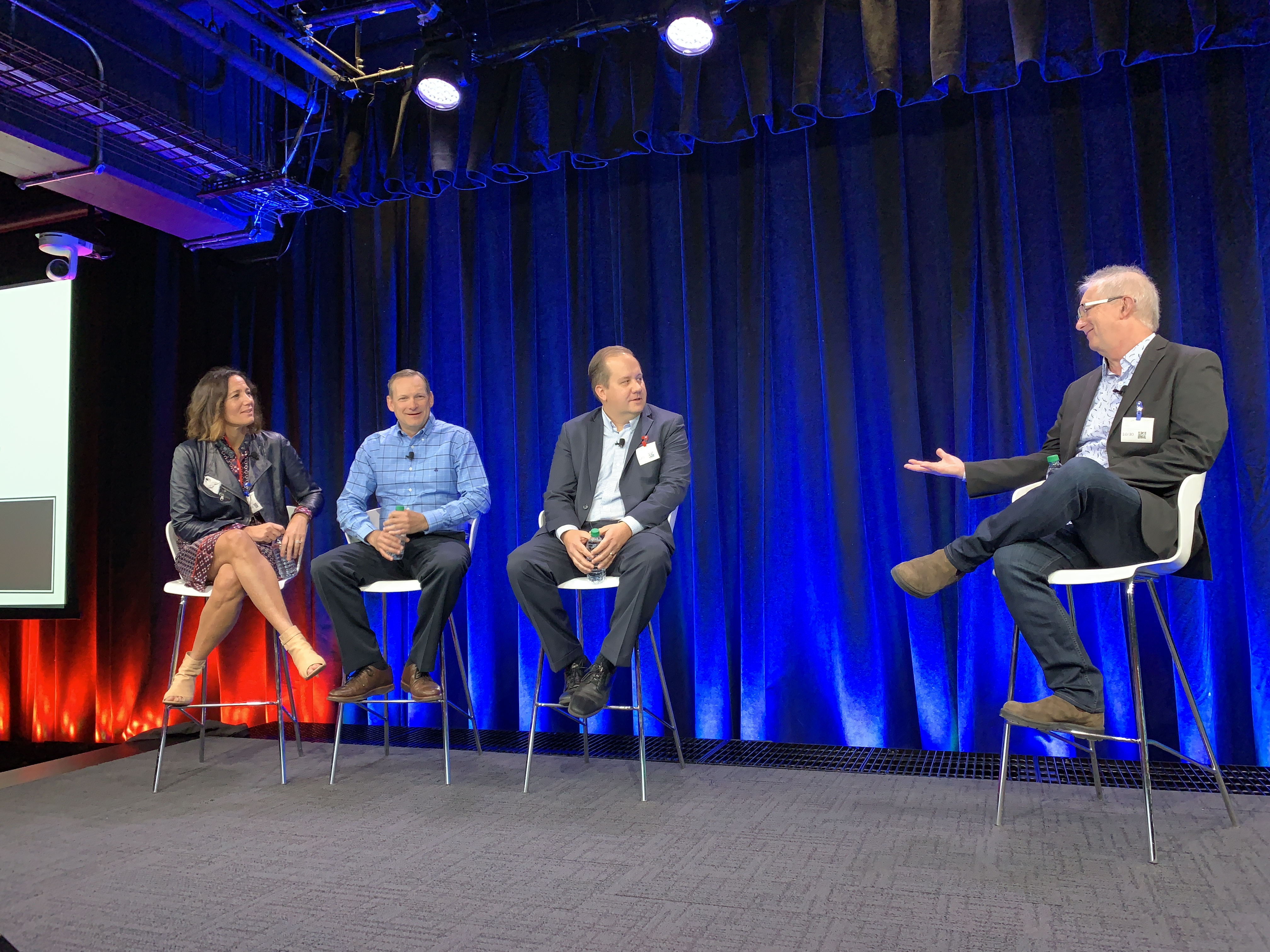Key Takeaways from Coffee & Controversy
On Tuesday, the Digital Signage Federation (DSF) held its annual Coffee & Controversy breakfast at Google’s NYC headquarters. Attended by more than 200 digital signage professionals, the event provided a forum for networking, conversation about the industry, and, of course, coffee (and lots of it).
The event was hosted by Richard Ventura, NEC’s vice president of strategic management and DSF chairman. Ventura, who is currently serving out his last few months as the organization’s chairman—he will serve as chairman emeritus beginning in early 2019—was excited to spread the message of the DSF and grow its membership. “The DSF is a non-profit that represents every single person in this room. It doesn’t matter if you’re an end user, a supplier, a DOOH operator, a consultant, someone who dabbles in digital signage, someone who lives in digital signage—it doesn’t matter. We’re about all of you and we’re a global organization,” he said.
After Ventura spoke, he handed the mic over to Dave Haynes, founder of Sixteen: Nine and moderator of the “controversy” panel featuring Chris Riegel, CEO, Stratacache; Jeff Hastings, CEO, BrightSign; and Beth Warren, SVP, Creative Realities. The group of experts discussed various digital signage topics like working with creative agencies, global growth, and retail rollouts.

Below are some key takeaways from the event.
Bigger Isn't Necessarily Better
“I see bigger, but I don’t necessarily see better,” Warren said. “I’ve seen wow, wow, wow, which can be beautiful and make a difference, but doesn’t necessarily solve a problem. I believe that digital needs to earn its right in the communications mix by solving some sort of problem—even if it’s just to inspire you.”
Someone IS Always Watching You
“The rule that we live by is that I never want a customer to be a front-page story on the Wall Street Journal and have it be a surprise,” said Riegel. “We may have a customer—like a bank, for example—tell us ‘we’re against cameras’ and we’ll say ‘Wait a minute. You have surveillance cameras everywhere to prevent theft and loss.’ It’s more of a communication and dialogue with the end customer. ‘Hey, we may be using cameras to try to better market toward you.’ As long as there’s disclosure, as long as the customer can opt out so you’re compliant with the law, then I think you’re fine. You just have to be very up front about it.”
“If you start pulling data that’s not anonymous, you start getting into where disclosure is required by law—which can differ in various countries," Hastings added. "But when it’s anonymous there and the display is making decisions [on what types of ads to display to consumers], I think people feel more comfortable."
A daily selection of the top stories for AV integrators, resellers and consultants. Sign up below.
Make It Scalable
“What I really like is when people do something that scales," Hastings said. "You can have your flagship store, you can create an unbelievably crazy experience, but then you look and that retailer has 2,000 stores and they [only] do it in the flagship and nobody really gets to see it. What I really like to see is when people do stuff in the flagship store and ask themselves how they can take that experience and put it into all of their stores.”
“Bezos is wicked smart,” Riegel said. “You put a white cat in his hand and he’s a Bond villain. He’s rich, he’s brilliant, and he’s going to eliminate a lot of retailers. That being said, in going to the Amazon Go store, knowing what they spent on that store, that’s not a scalable across the globe.”
Around the World
When asked by Haynes why he spent so much time in Asia, Riegel had a simple and succinct answer: “I have a map of China on my wall that says ‘More people live inside the circle than outside the circle.’ If you look at the rising Chinese middle class of 600 million people, and the U.S. middle class is 200 million people, I’m not Harvard educated but I can think that that might be the audience we need to go after for the next 20 years.”
“When you import stuff into China, there’s a 20 percent tax,” Hastings emphasized. “We see that, hopefully, with all this craziness going on that we’ll get a more level playing field [by adding a BrightSign facility in Hong Kong].”
When an audience member asked about digital signage in Latin America, the panel discussed several barriers to entry. “Latin America culturally is a very warm feeling, kind of a closed and cozy society,” said Warren, who has done a significant amount of work there. “So this kind of stuff is antithetical to their experience of community. Also, they tend to follow America; so I do think there will be a digital invasion at some scale, but it will be slow.”
Megan A. Dutta is a pro AV industry journalist, and the former content director for Systems Contractor News (SCN) and Digital Signage Magazine, both Future U.S. publications. Dutta previously served as the marketing communications manager at Peerless-AV, where she led the company’s marketing and communications department. Dutta is the recipient of AVIXA's 2017 Young AV Professional Award and Women in Consumer Technology's 2018 Woman to Watch Award. Dutta is co-founder of Women of Digital Signage, an organization designed to provide a pathway to promote networking, mentoring, and personal growth.

